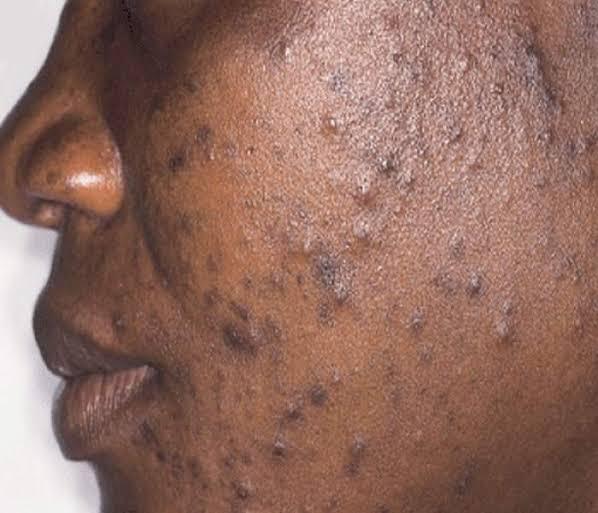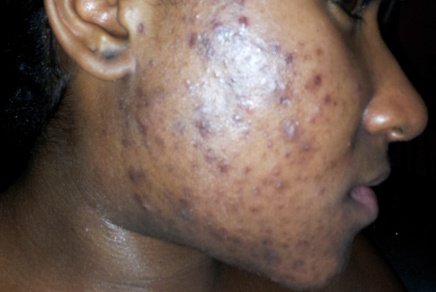Please listen carefully, I mean pay close attention if you have acne/pimples.
First, there are two groups of acne.
• non-inflammatory.
• inflammatory.
Identifying where your acnes belong is a key step to treating it.
Re-tweet: thread
First, there are two groups of acne.
• non-inflammatory.
• inflammatory.
Identifying where your acnes belong is a key step to treating it.
Re-tweet: thread
Non-inflammatory acnes includes whiteheads and blackheads.
Whiteheads are closed comedones, that is; your pores get clogged by sebum, and dead skin cells but the tip of your pores closes up.
Blackheads are open comedones. From the "whiteheads" explanation, I'm sure
Whiteheads are closed comedones, that is; your pores get clogged by sebum, and dead skin cells but the tip of your pores closes up.
Blackheads are open comedones. From the "whiteheads" explanation, I'm sure
You can guess correctly what blackheads mean now.
Non inflamed acnes don't result to any swelling at all.
Whiteheads are more difficult to treat because the pores are already closed, salicylic acid can help.
Salicylic acid is a beta hydroxy acid that's oil soluble
Non inflamed acnes don't result to any swelling at all.
Whiteheads are more difficult to treat because the pores are already closed, salicylic acid can help.
Salicylic acid is a beta hydroxy acid that's oil soluble
And basically destroys acne causing bacteria by exfoliating the pores. You can actually get this in facial cleansers, toners, or by itself in a liquid form.
But retinoids have been proven to offer best treatments for comedonal acnes.
Retinoids are a group of topical
But retinoids have been proven to offer best treatments for comedonal acnes.
Retinoids are a group of topical
Treatments derived from vitamin A. Differin gel or retinols can be prescribed topically but stronger prescriptions of retinoids should be prescribed by a dermatologist.
They're effective and work by speeding up cell turnover.
They're effective and work by speeding up cell turnover.
Pimples that are red and swollen are referred to as inflammed acnes, caused by bacteria, sebum, dead skin cells. Bacteria can cause an infection deep under the skin cells, resulting to painful acnes difficult to get rid off.
Inflammed acnes include:
• papules.
• pustules.
• Nodules.
• cysts.
Some Retinoids prescribed by a doctor can be effective in treating some inflammed acnes.
Benzoyl peroxide is a treatment commonly used in treating inflammed acnes as salicylic acid might be useless here.
• papules.
• pustules.
• Nodules.
• cysts.
Some Retinoids prescribed by a doctor can be effective in treating some inflammed acnes.
Benzoyl peroxide is a treatment commonly used in treating inflammed acnes as salicylic acid might be useless here.
But it actually depends on the severity of the acne. Even benzoyl peroxide might not do much for nodules or very painful swollen cysts which I would advise you to seek medical attention for.
Pustules & papules are a more moderate forms of inflammed acnes.
Pustules & papules are a more moderate forms of inflammed acnes.
Cysts and nodules need medical attention.
You can use benzoyl peroxide spot treatment for papules or pustules but it can be drying for some people and can cause some burning sensations.
So I prescribe mandelic acid, sulfur mask and hydration.
You can use benzoyl peroxide spot treatment for papules or pustules but it can be drying for some people and can cause some burning sensations.
So I prescribe mandelic acid, sulfur mask and hydration.
Mandelic acid is an Alpha hydroxy acid with anti-inflammatory properties.
Sulfur is gentler on the skin unlike benzoyl peroxide and works by drying out the surface of your skin, sucking out excess oil(sebum) that can contribute to acne breakouts.
Sulfur is gentler on the skin unlike benzoyl peroxide and works by drying out the surface of your skin, sucking out excess oil(sebum) that can contribute to acne breakouts.
Every acne whether inflammatory or not first starts with a clogged pore filled with excess sebum, dead skin cells, and bacteria.
Hydration is very necessary because your skin is built like a fence. Your skin cells are held together by lipids which prevent bacteria from coming
Hydration is very necessary because your skin is built like a fence. Your skin cells are held together by lipids which prevent bacteria from coming
In. Once these lipids degrade, your skin can be attacked by every form of terrible conditions. You maintain and repair these lipids by hydration and moisturizing.
You're technically "rebuilding the fence".
You're technically "rebuilding the fence".
Summarizing all these, you need a routine that focuses on acne treatment.
For non-inflammatory acnes: In the morning, use a facial cleanser that contains salicylic acid + hyaluronic acid serum which offers hydration + a Niacinamide serum which can help reduce texture
For non-inflammatory acnes: In the morning, use a facial cleanser that contains salicylic acid + hyaluronic acid serum which offers hydration + a Niacinamide serum which can help reduce texture
And regulate sebum production + a daily application of sunscreen.
At night: cleanse as well, hydrate, use a retinoid or retinol as stated in the tweet above. That's all.
For inflammed acnes: AM, cleanse with a normal gentle cleanser, hydrate with hyaluronic acid serum.
At night: cleanse as well, hydrate, use a retinoid or retinol as stated in the tweet above. That's all.
For inflammed acnes: AM, cleanse with a normal gentle cleanser, hydrate with hyaluronic acid serum.
Apply retinoids, and wear sunscreen.
At night: cleanse, wear your sulfur mask for about 15mins, rinse off and then hydrate with hyaluronic acid serum, Moisturize as well.
Hyaluronic acid serum is an humectant so powerful that 1 gram can hold 8 litres of water.
At night: cleanse, wear your sulfur mask for about 15mins, rinse off and then hydrate with hyaluronic acid serum, Moisturize as well.
Hyaluronic acid serum is an humectant so powerful that 1 gram can hold 8 litres of water.
A daily application means your skin will hold enough water. Humectants work by attracting moisture to your skin with the aim of stable hydration.
That's all you really need. Skincare is actually a lifestyle and not just using something because you need the benefits right now.
That's all you really need. Skincare is actually a lifestyle and not just using something because you need the benefits right now.
Its showing constant care to yourself.
A daily care for your skin will reduce your chances of getting your skin in trouble.
Finally, you need to be sure that what you're experiencing is actually acne.
A daily care for your skin will reduce your chances of getting your skin in trouble.
Finally, you need to be sure that what you're experiencing is actually acne.
There are several skin conditions resembling acne/pimples like:
1. Folliculitis.
2. Keratosis pilaris.
3. MILIA.
4. Rosacea.
5. Sebaceous filaments, etc.
Seeing a dermatologist is the only way you can receive full diagnosis.
I hope this really helps. Please re-tweet.
1. Folliculitis.
2. Keratosis pilaris.
3. MILIA.
4. Rosacea.
5. Sebaceous filaments, etc.
Seeing a dermatologist is the only way you can receive full diagnosis.
I hope this really helps. Please re-tweet.
If you've dark spots along with your acne as well, forget about the dark spots for now and focus is n your acne. Treating both together can be counter productive.
Don't forget follow me @skin_herball as I'm interested in the health of your skin, and I give dailly tips that can help you a great deal. I'm here because of you so tap on my follow button. Gracias

 Read on Twitter
Read on Twitter



